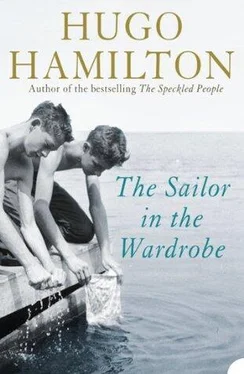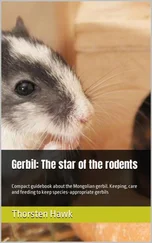She has thought of hiding it. She has thought of placing it in a vault, with a bank. But in the end it always goes back into the oak trunk with the heavy lid closed down again to keep the past inside.
I’ve heard my father talking to her late in the evening, saying he will never let anyone take it away from her, because it means as much to him at this stage. It was one of the first things that she showed to him when they met in Dublin after the war. He had lots of things to show her and places to bring her, like Saint Patrick’s Cathedral. She had stories to tell him about Germany and he had speeches to make about Ireland, but this book was the first thing that my mother could show him. He remembers leafing through it, knowing that he was holding something that was very close to her heart. It was a sign that she trusted him. He said it was like the ancient books transcribed by the Irish monks, and praised the Germans for inventing printing. It was the only thing that she owned, apart from her clothes, something she had never given out of her hands to anyone before. It was the start of all their luck. It was the start of this Irish-German family and all the stories that we made up along the way. How could she give all that back?
My father has turned himself into a tour guide for Ireland. It’s his country and he’s proud to take some days off to show Stefan the most important things about Irish history. He’s a very careful driver, keeping both hands on the steering wheel and stopping the car whenever he needs to explain something that cannot be said while driving. He brings us to Kilmainham Jail. We stop outside the GPO on O’Connell Street. We drive to Glendalough to see the round tower. We stand on beaches throwing stones and holding back the waves, as if we’ve come on holidays from Germany and haven’t seen open spaces like this for a long time. We’re amazed to see sheep again. We drive into the mountains with the windows open and get the feeling of being lifted up by the landscape, by the emptiness. We stop for lunch and my mother takes out her basket with separate packages of sandwiches. She is still trying to find out what Stefan likes to eat instead of cake, but it remains a mystery to her. We sit in a field with a rug spread out on the grass and everybody laughs because Bríd has begun to chew sideways like the sheep. We go for a walk with grass stalks in our mouths and decapitate wild flowers. My father is not the kind of man who keeps a stem of grass between his lips. Even with his shirt open, he looks like he is thinking about something that still has to be done to improve Ireland, to keep this landscape from disappearing. We climb halfway up a mountain and look back at the small grey Opel Kadett parked like a toy car along the road. We see the houses and the small people of Ireland working in the fields below us. My father holds his arm stretched out in front of him and tells Stefan to look across the landscape with his eyes open, because there are certain things that can only be seen in the Irish language.
‘In English,’ my father says, ‘you can only see as far as the eye can see.’
On the way home he is looking for Echo Gate, driving up and down country roads for a long time saying it can’t possibly be gone away. My mother points at lots of gates and tells him to stop so we can shout over them to see if we can hear anything coming back, but he drives on with a determined look on his face until he finally comes to the right place and we all stand shouting across the gate towards the ruins of the monastery. The echo is very clear. We count how many seconds it takes for a word to come back. We shout in German, with the sun going down and the cows looking up, wondering what we’re saying. It’s a perfect echo each time, as if the fields know our language. A whole family shouting back at us with great excitement, as if they had been waiting there for centuries, and this is the first time somebody has come to the gate who understands them. Our voices have come out from under the mossy stones and start calling back, hoping we don’t leave again.
‘How are you all over there and how did you know we were coming?’ my father shouts in Irish. When the echo comes back, my mother says it must be Irish because who else would answer a question with another question? The sky changes in layers of yellow and purple and deep grey. We can see the dark outline of the ruins fading against the land. Stefan is barking like a dog. Ciarán climbs the gate and Maria stands beside him, singing a do-re-mi ladder of notes that stands up against the sky and we’re like a family laughing at ourselves in the mirror. Even when we get back into the car and drive away, my mother’s voice is still laughing around the ruins after it gets dark.
Each time we arrive home again, my father sits down to make notes on the trip, how many miles have been travelled and how much petrol was used. My father is not the kind of man who washes his car every weekend, but he is the kind of man who keeps a little notebook where he records every detail and tries to get as many miles per gallon as possible. He checks the pressure in the tyres before and after every journey, and at the end of the long trip back from Echo Gate, he lets the air out and replaces it with fresh air, until Stefan tells him very politely that it doesn’t make any sense and the quality of the air inside the tyre is not what matters. Stefan can say things to my father that we would be afraid to say, because he doesn’t like to be criticized by his own family.
I become a tour guide myself and take Stefan out fishing with Franz. Stefan cooks the mackerel we catch with a funny new Irish recipe given to him by Dan Turley, grilling the fish and sprinkling cornflakes on the top. At last, my mother finds something that Stefan likes to eat instead of cake and begins to bake barm brack. We play cards and chess and go to the field every day to play football. Stefan is so clever with his feet that other boys come to watch and join in because football needs no language. He can make the ball disappear from under their feet and they start calling him Beckenbauer. So it’s Eichmann and Beckenbauer and Hitler playing together in the football field until Stefan gets fed up with his new name.
I showed him the place where they found the body of a murdered woman. I brought him to the spot on the seafront where the body of Peggy Flynn was discovered. It was in the papers and everybody was talking about it for months in the shops. They said it was too nice a location for something like that to happen and now it was changed for ever, as if the landscape would never heal. They said it was terrible to think of her being found dead with her face down in the water and her hair waving around like seaweed, with crabs and sea-lice crawling over her. Some of them could not even utter the word murder and called it a tragedy, as if they wanted to restore her dignity. Special prayers were said at Mass on Sundays. The priest called it a shock to the core of the heart. It was un-Irish and they believed it was coming from somewhere else, from abroad, from places that had no religion, where people had no morality. They were worried that the murderer was never found and it frightened them to think it could be somebody normal walking around the streets of Dublin like anyone else.
Even long after the body was taken away and the Gardai had carried out all their investigations, they still kept people away from the scene. A squad car was parked there with two officers looking out towards the sea, as if they were expecting the perpetrator to come back and look for something he might have left behind or dropped accidentally.
I knew I was the murderer. I had not actually murdered Peggy Flynn, but how could I be sure I might not murder somebody in the future some time? I could not trust myself. When the squad car eventually disappeared from the seafront, I started going down every day like a perpetrator returning to the site of the crime. I stood there and knew exactly what it was like for the person who murdered her. He must have thought he got away with it and that he could return to the scene like any other normal person, but he was obsessed by her. Not a day went by without her name coming back to him. His own deed was like rat poison turning his stomach inside out. I stood looking out over the rocks where she was found, with the waves moving the seaweed backwards and forwards and the seagulls on the rocks keeping watch. I thought of her name, Peggy Flynn. I could hear her voice in my head, talking to me and asking me what the matter was. I thought of the way she looked, wearing a tweedy skirt, above the knees. I saw her laughing and making faces at her friends. I saw her getting off work and walking through the streets of Dublin where I go to school, waiting for a bus on Parnell Square, searching in her handbag and looking sideways at me, throwing her head back to get the hair out of her eyes. Again and again, throwing her head right back and smiling at me, before her hair slowly started dropping down over her forehead like a slow curtain in the cinema.
Читать дальше
Конец ознакомительного отрывка
Купить книгу












